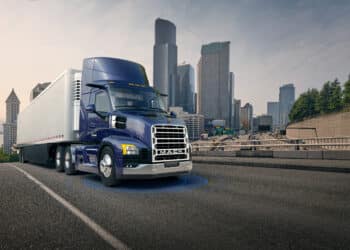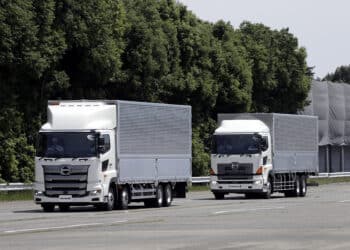Equipment Finance News’ top transportation stories in 2024 showcase the past, present and future of the industry colliding. Pandemic-era freight and logistics issues put one company out of business amid rising defaults and delinquencies, and the future of EVs and a major technology outage also shaped the year’s concerns.
1. Canada’s Pride Group files for bankruptcy
Canadian transportation and logistics firm Pride Group and its 25 affiliates filed for Chapter 15 bankruptcy in the United States in March, one of the biggest stories in the equipment industry in 2025. But its biggest impact hit the transportation sector.
The bankruptcy stemmed from market challenges, including an oversupply of trucking services and rising diesel fuel rates and interest rates that plagued several firms and served as an omen for other bankruptcies, such as Yellow Trucks. While the Pride Group and its affiliates continue to sort out the future, the trucking industry looks to overcome the downturn in 2024.
2. Rising truck defaults, delinquencies expected to persist
The transportation finance industry also grappled with mounting defaults and delinquencies in what some called an industry-specific recession. Elevated charge-offs underscored the financial strain — the transportation sector accounts for nearly 25% of the equipment finance market — as bankruptcies such as Pride Group and Yellow, prompted lenders to adopt more selective risk management practices and emphasize equipment recovery.
3. Majority of fleet executives unprepared for looming challenge
The looming California Air Resources Board (CARB) and the U.S. Environmental Protection Agency (EPA) emissions mandates, to take effect in 2027, are driving the largest anticipated truck prebuy in history, with many fleet managers unprepared for the resulting inventory and pricing challenges. CARB regulations mean stricter NOx standards and require zero-emission vehicles for state and local government fleets.
With truck production capped at around 300,000 units annually, planning is crucial to avoid financial and operational disruptions, especially as many fleets already operate aging vehicles and face escalating replacement costs.

4. Charged up: Financiers prep for the EV future
Stricter 2027 emissions standards from CARB and the EPA are pushing commercial EV financiers and charging manufacturers to work together to meet customer demand and prepare for electric commercial vehicles.
Charging-as-a-service initiatives support infrastructure needs, with partnerships like Mitsubishi HC Capital America and Electrada, enabling bundled financing for EVs and chargers. Still, as demand for EVs grows, especially for Class 3 through Class 6 vehicles due to cost-effectiveness, significant challenges remain. These include high costs, grid limitations and insufficient charging infrastructure.
5. CDK Global attack impacts truck dealers
Commercial truck dealers this year grappled with the effects of a cybersecurity attack on CDK Global, a dealer management system provider, that rendered many systems inoperable. Over 15,000 dealerships were affected, including major groups like All-American Ford, Larson Group, Premier Truck Group and Rihm Kenworth. Many were forced to operate manually for several days, even weeks.
The attack is part of a broader rise in cybersecurity threats, with 3,205 data compromises reported in 2023, a 78% increase from 2022. The hit to the computer systems also highlighted the importance of having strong systems for managing and protecting data.
The third annual Equipment Finance Connect at the JW Marriott Nashville in Nashville, Tenn., on May 14-15, 2025, is the only event that brings together equipment dealers and lenders to share insights, attend discussions on crucial industry topics and network with peers. Learn more about the event and register here.









